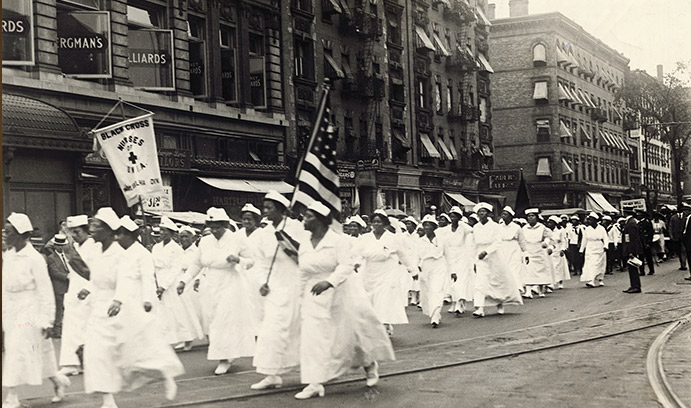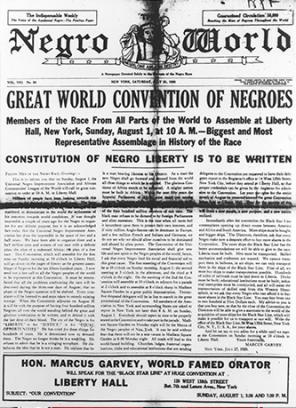Efficient Womanhood

Black Cross Nurses parade through Harlem at the opening of the annual world convention of the Universal Negro Improvement Association. (Photo courtesy of Underwood & Underwood via Corbis)
The Universal Negro Improvement Association (UNIA) was created in the early part of the 20th century to promote racial pride, economic self-sufficiency and the formation of a black nation in Africa. The UNIA was the world's largest black organization for social justice, and the role of women in shaping the organization is being studied by Natanya Duncan.
The UNIA was founded by Amy Ashwood and Marcus Garvey in 1914, and from its inception women within the organization defied given notions of domestic duty and blurred the lines drawn for women of the time, says Duncan, assistant professor of history and Africana studies.
"Women are in this from day one," she says. "When they constituted the organization, the original signers included four women."
Respectability for women in the UNIA was defined by a practice of nationalist politics in public places, resulting in what Duncan calls an "efficient womanhood" that set the stage for what are now known as womanist consciousness and black feminist politics.
"The organization successfully connected people in communities around the world. It's the first time African Americans are publicly encouraged to articulate their sense of identity beyond the space in which they live," she adds.
By 1920 Garvey claimed nearly 1,000 local divisions in the United States, the Caribbean, Central America, Canada and Africa. By 1925, women were running the UNIA, and Duncan argues that these women equipped themselves to play a crucial role in the organization. Her research centers on the writing found in the Negro World newspaper, a weekly newspaper with worldwide circulation, created by Garvey as the official UNIA publication. While the Negro World preached Garvey's philosophy and featured a front-page editorial penned by Garvey himself, its pages focused on news items covering global current events, politics and the status of black people in the United States and abroad. Duncan argues the crucial role of women are found in the pages of newspaper's Division News and Views Section, Magazine Section as well as its People's Forum. Poetry in particular, she says, in the Negro World provides key insights and first-hand accounts of women's activism in and beyond the organization.
Examples of this can be found in the poems of female Garveyites published in the newspaper. Duncan asserts that, through Ethel Trew Dunlap's poetry, and other UNIA women poets from 1919 to 1940, women voiced their views on equality and freedom in the paper. Their poetry furthered the "efficient womanhood" brand of activism that used negotiation and direct public confrontation as benchmarks for gaining a larger voice in both private and public circles, adds Duncan.
The Jamaica-born Garvey was convicted of mail fraud in 1925 and deported in1927, leading to the newspaper's closing in 1933. Poetry is one of the paper's undervalued contributions to women's activism, as it created a lasting imprint on black communities, says Duncan.
"They put out small Haikus that could be easily taught to children to memorize. This helped the ideals of the organization to become a part of their fabric, their thinking. The legacy of the organization transcended space and time such that whether there was a UNIA branch nearby or not did not matter. The poetry became a part of the community speak and thus helped the UNIA take on a life far and beyond Garvey himself."
Posted on:


